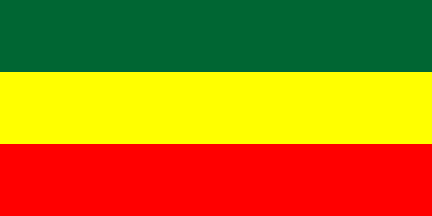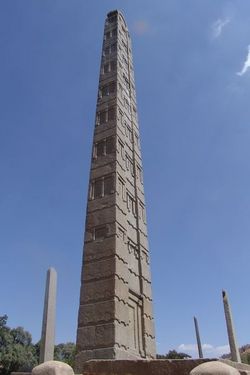

|

|
The Ethiopian Flag 
|
International Peace Half-Marathon (13.1 miles, 21.0975 km)
|
We met with National Park Service on August 12. NPS was willing to grant us a permit, but their permit conditions would have cost us about $4,000, and we would not be permitted to use the parking at Belle Haven. So we decided to cancel the event for 2009. We had 36 pre-entrants, and we are either refunding the pre-payments to them in full or making other arrangements at their request. We apologize for the inconvenience. • Confirm your entry • For more information, call 703-927-4833 or write racedirector@att.net |
|
|
 IN MEMORY OF A MAN WHO CHANGED THE WORLD. Abebe
Bikila was born in Mout, Ethiopia, August 7, 1932, the day of the
1932 Los Angeles Olympic Marathon. 28 years later, he ran the
1960 Rome Olympic Marathon barefooted. He and his coach, Onni Niskanen,
planned his decisive move to be one kilometer from the finish, where the course passed the
Obelisk of Axum (see photo), a monument plundered from Ethiopia by Italian troops
in 1935 and taken to Rome. When Bikila reached the obelisk,
he pulled away from Rhadi Ben Abdesselem of Morocco to win by 200m in 2:15:16.
His victory made him a national hero and inspired athletes around the
world. At the 1964 Tokyo Olympic Marathon,
despite an appendectomy 40 days before the race, Bikila ran again, this time in socks and shoes.
He took the lead by the halfway mark and
won by more than four minutes. His time,
2:12:11, was a world best for the marathon -- and the first
time anyone won two Olympic marathons. Instead of a victory lap
in Olympic Stadium, he performed jumping jacks and other exercises
after his race while other runners crossed the finish line.
At the 1968 Mexico City Olympic Marathon, Bikila tried for a third win, but affected by the heat and altitude, he dropped
out after 17 kilometers, instead cheering on his countryman Mamo Wolde to
victory. In 1969,
a car crash near Addis Ababa left Bikila paralyzed from
the waist down. As a wheelchair athlete, he won gold medals in 1970 at 10K and 25K cross-country sledge competitions in Norway,
but he never regained full health and died in Addis Ababa
on October 25, 1973. Sources: www.wikipedia.org
| www.olympic.org
|
www.ethiopians.com
The Obelisk of Axum that motivated Abebe
Bikila was returned to Axum, Ethiopia, in April 2005
and awaits re-assembly. Bilila's memory lives on.
IN MEMORY OF A MAN WHO CHANGED THE WORLD. Abebe
Bikila was born in Mout, Ethiopia, August 7, 1932, the day of the
1932 Los Angeles Olympic Marathon. 28 years later, he ran the
1960 Rome Olympic Marathon barefooted. He and his coach, Onni Niskanen,
planned his decisive move to be one kilometer from the finish, where the course passed the
Obelisk of Axum (see photo), a monument plundered from Ethiopia by Italian troops
in 1935 and taken to Rome. When Bikila reached the obelisk,
he pulled away from Rhadi Ben Abdesselem of Morocco to win by 200m in 2:15:16.
His victory made him a national hero and inspired athletes around the
world. At the 1964 Tokyo Olympic Marathon,
despite an appendectomy 40 days before the race, Bikila ran again, this time in socks and shoes.
He took the lead by the halfway mark and
won by more than four minutes. His time,
2:12:11, was a world best for the marathon -- and the first
time anyone won two Olympic marathons. Instead of a victory lap
in Olympic Stadium, he performed jumping jacks and other exercises
after his race while other runners crossed the finish line.
At the 1968 Mexico City Olympic Marathon, Bikila tried for a third win, but affected by the heat and altitude, he dropped
out after 17 kilometers, instead cheering on his countryman Mamo Wolde to
victory. In 1969,
a car crash near Addis Ababa left Bikila paralyzed from
the waist down. As a wheelchair athlete, he won gold medals in 1970 at 10K and 25K cross-country sledge competitions in Norway,
but he never regained full health and died in Addis Ababa
on October 25, 1973. Sources: www.wikipedia.org
| www.olympic.org
|
www.ethiopians.com
The Obelisk of Axum that motivated Abebe
Bikila was returned to Axum, Ethiopia, in April 2005
and awaits re-assembly. Bilila's memory lives on.




